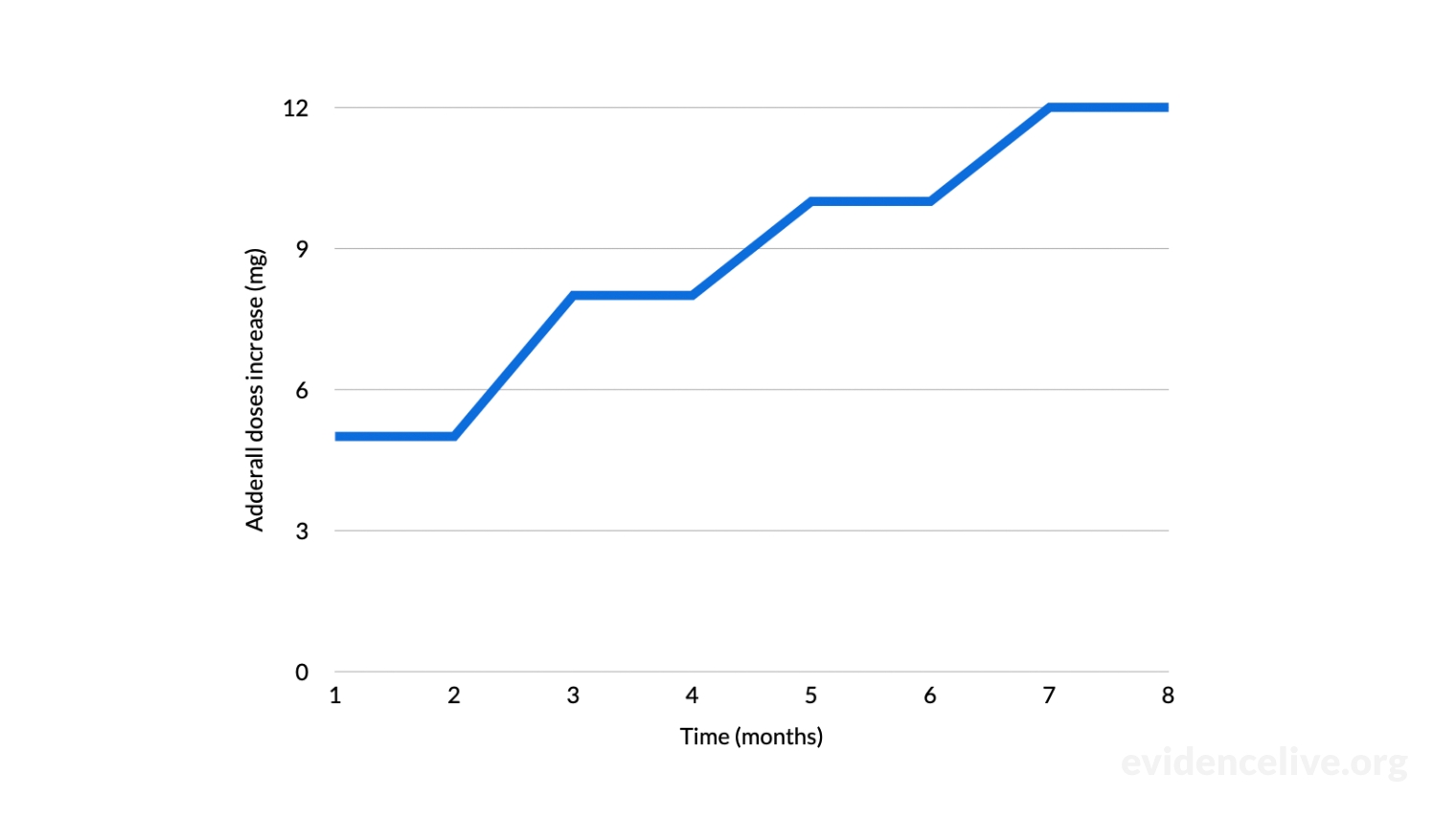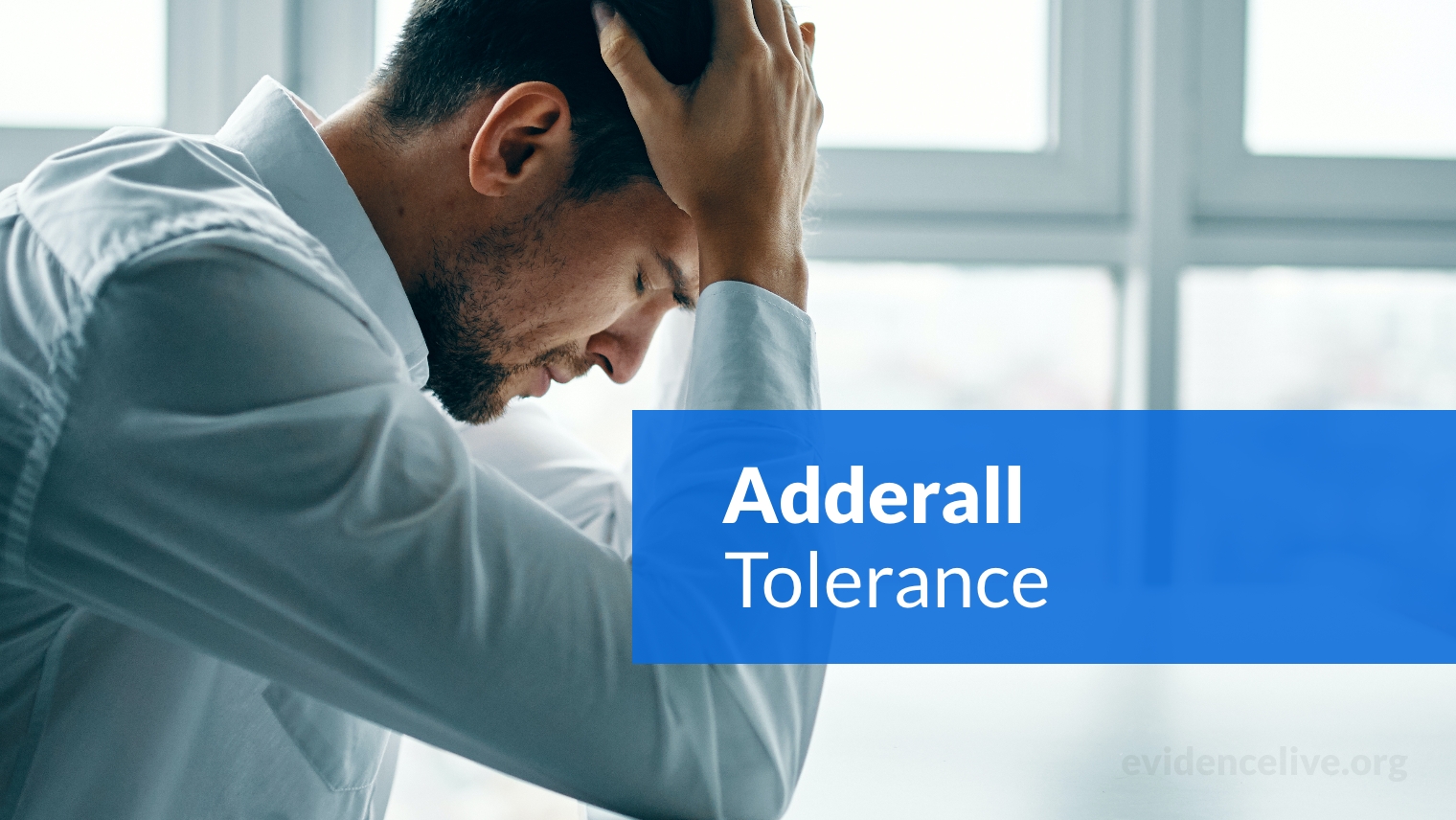Adderall is a common prescription drug containing amphetamine used for attention-deficit hyperactivity disorder, ADHD, but it is also used off-label for focus, energy, and nootropic effects.
However, Adderall abuse can cause tolerance when heftier use or frequent doses to achieve the results.
This can cause more adverse effects and negative reactions or even lead to Adderall addiction. Knowing how long it takes to develop a tolerance and what you can do to prevent it can help you avoid higher doses and drug abuse.
Contents
Can You Build a Tolerance To Adderall?
While tolerance is often associated with substance abuse, it can happen even when taking Adderall the way that it is prescribed.
Adderall is a prescription drug usually prescribed for either sleep disorders like narcolepsy or attention-deficit hyperactivity disorder (ADHD) treatment.
Central nervous system stimulant drugs help with ADHD symptoms such as difficulty focusing and impulsive behaviors.
However, when resilience to Adderall develops, it may lose effectiveness for the many benefits that it can provide.
This is also true with off-label Adderall abuse as a nootropic, smart drug to help you stay focused, promote weight loss, or eliminate fatigue.
What Causes Adderall Tolerance?
Clinical neuroscience shows that Adderall tolerance build may be caused at least partially by less effective neurotransmitters, primarily less activity at dopamine receptors (1).
Dopamine is part of the reward system responsible for many of the outcomes of Adderall, particularly the effects desired by people abusing Adderall, like an increase in mood or euphoric feelings.
These changes in brain chemistry and the biological process can eventually develop tolerance to prescription stimulants like Adderall.
Tolerance can build with Adderall immediate-release and with Adderall XR, which is the formula for extended-release.
However, tolerance does require the use of regular dosages. An occasional dose of Adderall is unlikely to cause much, if any, drug tolerance (2).
What Are The Downsides?
Substance use causing extreme resilience can cause adverse effects, for example, anxiety, poor memory, sleep issues like insomnia, dizziness, mental health issues, headaches, poor appetite, nausea, nervousness, and other dangerous reactions to illicit use of ADHD medications.
It also increases the risk of Adderall addiction or overdose caused by excessive Adderall use, especially for people with an underlying condition related to abuse of other substances or drugs.
Since Adderall tolerance is inevitable if you take a daily dose of Adderall, knowing how long it takes for developing tolerance eventually can be helpful.
Adderall Tolerance Chart Timeline
This timeline can help you determine whether it is an Adderall tolerance build causing decreased effects or another reason your initial dose of Adderall is not working like it used to.

How Long Does It Take To Get Used To Adderall?
Because of how Adderall works, several factors can change the speed at which you develop a tolerance to ADHD medications.
In some cases, having a natural resistance built up to stimulant treatment can be a good thing because of the lowered likelihood of uncomfortable adverse reactions.
It will only take 5 to 7 days for minimal tolerance, and if the side effects last longer than that, then the current dose may be too high. Other tolerance issues can take a while to develop for many people.
When taking extreme amounts or more than typical for stimulant medication and prescribed uses, you may find that tolerance increase can happen in a week or even less.
Sometimes changes in resilience changes only a few weeks after you start taking your first dose are caused by low doses that are not sufficient for the long-term use of stimulant medications.
Once you are on maintenance and effective dosage that is enough for managing ADHD symptoms without negative outcomes, you shouldn’t become accustomed to the drug for a few months at the very earliest, but up to a few years in some cases without change to the same therapeutic benefit.
Factors That Affect Tolerance Development
Adderall dose is the most obvious factor influencing the speed of growing accustomed to ADHD medication like amphetamine. Larger doses are more likely to cause rapid addiction, dopamine receptor issues, and resilience risk.
Lessened results will continue to happen if you are taking Adderall or other prescription drugs higher than the original dose because it floods the receptors with chemical signaling.
The same is true about frequent use and a suddenly increased dose that is more common with Adderall misuse or drug abuse of prescription medication. Someone who chooses to abuse Adderall is more likely to need a higher, more potent dosage to get the same benefits.
If you take any other medications or other drugs with Adderall, you may become tolerant more quickly than if you didn’t mix with other stimulants, medication, or illegal drugs.
Other factors also play a role, like genetics and predisposition toward addiction or natural resilience to the effect of stimulant medication.
Age, body weight, height, sleep routines, and even stress can also influence the speed you become accustomed to the drug.
Why Is My Adderall Not Working Anymore?
There are many reasons why high dose Adderall may not help you focus like it used to. The first, and most likely, is simply Adderall tolerance.
If you take any medication daily, then resistance will happen, but it may be slowly and only push you up to a higher dose gradually over the years. Still, it can make the drug stop working in some instances.
Another instance known for leading a drug to stop working is a change with the initial condition. If the problem worsens, the medicine may not be as effective because of increasing symptoms, and you may have to take more for proper treatment.
The opposite can also happen where ADHD is short-term or caused by illness, infection, or behavior. Again, this can alter the efficiency and make the Adderall work less than before or cause more severe side effects.
Changes in biology, health, body weight, and other changes can cause many drugs to stop working. This can make the effects of Adderall to become decreased or increased and sometimes require a shift in the type of medication or dose.
Finally, it is common for people on long-term treatment for a condition to become so used to the results that they think the ADHD medication is not working the way it used to.
That is just because the drug’s effect is not noticeable anymore, but it is still working fine. If you cease to use, you may notice oncoming symptoms again quite rapidly.
How To Reduce Adderall Tolerance?
If a drug is no longer working how you want it to, you probably want to reset your tolerance.
Without exception, there is not an easy way to improve resilience and biological balance for increasing the impact of a drug.
So let’s look at the only way to bring that tolerance back down.
You Have To Take a Break For Tolerance Reset
The only way to bring tolerance to Adderall down after it already exists is by taking a break. Taking a higher drug amount may seem like good reasoning, but it will only enhance resilience more in the long run.
To indeed aid tolerance issues, you must lower or cease doses. However, methods exist for preventing you from becoming resistant in the first place.
Sometimes a cycling process can support less resilience. This would mean you take the drug for a few days and then take a short break for a couple of days to reset tolerance occasionally before it increases too much.
Some people claim that the use of vitamin D, zinc, and other vitamins and nutrients may help prevent Adderall tolerance.
Furthermore, some people say that l-tyrosine supplements and other products may potentiate Adderall and make it stronger. This will not, however, reduce resilience and may increase it.
What About Adderall Withdrawal?
Medication use, particularly with those who abuse Adderall or any other stimulants such as amphetamines, can cause addiction.
When you have developed a dependence on the drug, you will experience Adderall withdrawal symptoms when you take a break or discontinue use.
In a severe case of amphetamine addiction, you may have to undergo addiction treatment.
A doctor can often work with your substance use as a form of addiction treatment, but rehab or other methods may be required in some cases.
The National Institute of Drug Addiction says that dependence and withdrawal cause symptoms including fatigue, insomnia, excessive sleeping akin to narcolepsy, increased appetite, nightmares, depression, anxiety, a cognitive impact, and other uncomfortable or distressing symptoms (3).
Also, it may contribute to worsening ADHD issues when treatment needs a break. However, some substances, nootropics, and natural alternatives for Adderall can help with these types of symptoms or provide some of the results you are missing when discontinuing use.
Many are gentle on the body and preferable for recovery when you stop taking the more dangerous ADHD medicines.
How Long Does Tolerance To Adderall Last?
Once you grow accustomed to substance use and the influence on the body is not so life-changing, a break will alleviate the negative impact on the brain.
A doctor can help you with this process and even taper the medicine, but you probably still want to know how long you can expect to be off the substance before your resilience is reset.
Just a week without the presence of the chemical can make a big difference as the brain receptors become reset and less flooded.
This can allow the body to enter recovery and resilience to decrease, but it may take two weeks for amphetamine tolerance to reduce completely.
Conclusion
Regular use of any substance is likely to cause some tolerance, but even though that can cause some problems, it usually isn’t too hard to take a break.
However, if this is too uncomfortable or when discontinuing treatment causes more problems than it solves, then you can talk to a doctor or seek out potential alternatives and supplement options that may help.
While it is impossible to decrease resilience without ceasing use, there may also be other strategies that are more comfortable than cold turkey discontinuation.
You may even find that the Adderall needed is less than you thought for the impact on the brain and behavior.

